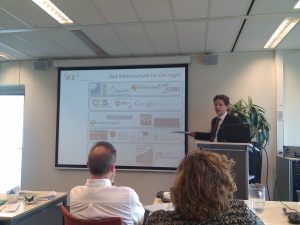News Story
The financial sustainability of CORE sought as part of a global package of key Open Access services
Thursday 27 Mar 2014
A study commissioned by the Knowledge Exchange (see the link below), a Danish Agency for Culture supported by a a number of international funders, worked to identify Open Access services across the world that are key to the future of scholarly communication. The aim was to analyse the financial challenges these services face and create a shared strategy that would guarantee their sustainability. The services discussed in the study are used by millions of academics on a daily basis and are already an essential part of the research ecosystem. They include arXiv.org, EPrints, the Public Library of Science (PLoS), the Public Knowledge Project (PKP) and the Directory of Open Access Journals (DOAJ). The CORE system developed in KMi is among these service.
When the study was published, the Knowledge Exchange funders organised a workshop in Utrecht, The Netherlands inviting a representative for each of the services. The KMi’s Petr Knoth attended the meeting representing CORE.
The meeting showed that the key services forming the Open Access ecosystem (Neil Jacob’s of Jisc presented the overview of them – see photo) are often in very different situations. Some of them, such as the BASE system, receive a significant financial contribution from their own institution in the spirit of supporting Open Access, while other institutions see these services rather as an opportunity to generate profit to improve their own budget. These institutions do not consider their share of responsibility for the future of scholarly communication or they do not embrace the ideas of openness of research outputs and education for all. Consequently, some of these services, such as DOAJ, already left the academic environment as they can be more efficiently provided through a not-for-profit company.
While there was a whole range of issues discussed, the most critical included:
– The continuous need of funding: It is very difficult or even impossible for many of these services to charge the end-user a fee as this goes directly against their mission.
– The institutional greed: Universities are often not willing to lower the overheads for these services. Libraries are typically not willing to contribute even a small percentage (in the range of 1%) of their commercial services and articles subscription budgets (Elsevier, EBSCO, SciVal, etc) to Open Access services.
– Supporting a global service at the local level: Universities and libraries are typically not willing to financially contribute to a service which benefits the whole world, not just them.
One of the outcomes of the meeting was that a package of these Open Access critical services should be created and certain funders that distribute money to universities and libraries, such as HEFCE, should mandate a financial contribution to the sustainability of Open Access services. This strategy is now being explored by the Knowledge Exchange.
Related Links:
Connected
Latest News
KMi’s Dr. Retno Larasati Delivers Keynote on ‘Ethics in AI Education’ at ICONSEIR 2025
Celebrating Ortenz Rose: 45+ Years at The Open University
Transforming transport with AI: KMi and ClearView’s vision for smart cities







